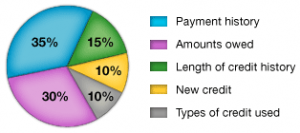 While FICO isn’t giving away all of their secrets, they have now revealed the damage done by a few common credit scenarios.
While FICO isn’t giving away all of their secrets, they have now revealed the damage done by a few common credit scenarios.
Unfortunately, in the current economy, these scenarios aren’t so much mistakes as situations/events caused by widespread unemployment and pay cuts.
Interestingly, the “Damage Points” chart shows that the higher your current credit score, the more damage will be done by one of these events.
Topping the list of most damaging to credit scores is bankruptcy. A consumer with credit scores averaging 780 or more can expect scores to drop 220-240 points, while a consumer with scores of 680 will see a drop of only 130-150 points.
Least damaging is a maxed-out credit card, hurting those with 680 scores by only 10 to 30 points, and dropping a 780 score by 25 to 40 points.
Depending upon your initial scores, a 30-day late payment will drop scores from 60 to 110 points, debt settlement will cause a drop of 45 to 125 points, and foreclosure will have an 85 to 160 point effect.
Lenders use these scores to determine your credit worthiness. In general, the higher your scores the greater your chance of getting a loan, and getting a favorable interest rate on that loan. However, credit scores are not the only criteria. Lenders also look at other details, such as your total debt to income, the length of time you’ve been on your job, and the number of dollars you have in savings.
These situations can’t really fall under the category of credit mistakes, but we know there are plenty of mistakes that can affect your credit.
For instance, the report shows the damage if you max out a credit card. What’s the damage if you use 65% of your available credit instead of staying below the recommended 30%? What’s the impact if you let a merchant or a prospective landlord run a credit check on you? How much will it hurt if you get mad at a credit card that’s raised your interest rate – and close that account? How damaging is it to not carry any credit cards?
Since we don’t know the answers to those questions, the best course of action is to use credit, but use it sparingly, and pay all bills on time. If you carry several credit cards, be sure your balances are spread out, showing that you have access to far more credit than you use on each card. And don’t let anyone check your credit until you’re sure you’re ready to make a purchase.
Finally, keep a close eye on your credit report and correct all errors promptly.
Author: Mike Clover
CreditScoreQuick.com your resource for credit reports, credit cards, loans, and Credit News.




